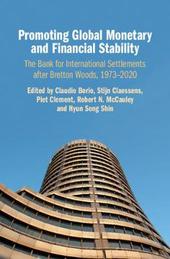
|
Promoting Global Monetary and Financial Stability: The Bank for International Settlements after Bretton Woods, 1973-2020
Hardback
Main Details
| Title |
Promoting Global Monetary and Financial Stability: The Bank for International Settlements after Bretton Woods, 1973-2020
|
| Authors and Contributors |
Edited by Claudio Borio
|
|
Edited by Stijn Claessens
|
|
Edited by Piet Clement
|
|
Edited by Robert N. McCauley
|
|
Edited by Hyun Song Shin
|
| Series | Studies in Macroeconomic History |
|---|
| Physical Properties |
| Format:Hardback | | Pages:302 | | Dimensions(mm): Height 234,Width 156 |
|
| Category/Genre | Macroeconomics
Economic history |
|---|
| ISBN/Barcode |
9781108495981
|
| Classifications | Dewey:332.15509045 |
|---|
| Audience | | Professional & Vocational | |
|---|
| Illustrations |
Worked examples or Exercises; 3 Tables, black and white; 32 Halftones, black and white; 3 Line drawings, black and white
|
|
Publishing Details |
| Publisher |
Cambridge University Press
|
| Imprint |
Cambridge University Press
|
| Publication Date |
30 April 2020 |
| Publication Country |
United Kingdom
|
Description
As the global organisation of central banks, the Bank for International Settlements (BIS) has played a significant role in the momentous changes the international monetary and financial system has undergone over the past half century. This book offers a key contribution to understanding these changes. It explores the rise of the emerging market economies, the resulting shifts in the governance of the international financial system, and the role of central bank cooperation in this process. In this truly multidisciplinary effort, scholars from the fields of economics, history, political science and law unravel the most poignant episodes that marked this period, including European monetary unification, the paradigm shifts in economic and financial analysis, the origins and influence of macro-financial stability frameworks, the rise of soft law in international financial governance, central bank crisis management in the wake of the Great Financial Crisis, and, finally, the institutional evolution of the BIS itself.
Author Biography
Claudio Borio is Head of the Monetary and Economic Department at the Bank for International Settlements. Stijn Claessens is Head of Financial Stability Policy and Deputy Head of the Monetary and Economic Department at the Bank for International Settlements. Piet Clement is historian at the Bank for International Settlements. He is a member of the Academic Council of the European Association for Banking and Financial History. Robert N. McCauley was a senior economist and adviser at the Bank for International Settlements from 1994 until his retirement in 2019. Hyun Song Shin is Economic Adviser and Head of Research at the Bank for International Settlements.
Reviews'The Bank for International Settlements, the most 'secretive' of international financial institutions, is where the central bankers of the world have their most open and confidential discussions. A distinctive trait of the BIS, throughout its history, has been its attention to financial stability. Taking a BIS perspective, this book offers unique insights into the history of the post Bretton Woods international monetary and financial system. A must-read.' Ivo Maes, National Bank of Belgium and University of Louvain 'Written by a group of distinguished scholars, this volume is an excellent sequel to Gianni Toniolo's account of the BIS from 1930 to 1973. With great skill and precision, the six contributions navigate through the turbulent times since the end of Bretton Woods, with the BIS at the center of action. A must-read for anyone interested in global financial and monetary history.' Tobias Straumann, University of Zurich 'The rise of new nationalisms and shrinking consensus for global free trade have distracted us from how closely integrated the world economy remains and the importance of a coordinated global policy to ensure financial stability. This timeliest of volumes carefully lays out the history and rationale behind the Bank for International Settlements' struggle to coordinate national policies, from the breakdown of Bretton Woods to the present. It is essential briefing for every policy maker and every new graduate student in macroeconomics or finance.' Eugene N. White, Rutgers University and National Bureau of Economic Research 'This book provides an excellent and authoritative account of BIS' evolving role in the international coordination of monetary and financial stability policies, and as the birthplace of new ideas like macro-prudential policies.' Markus Brunnermeier, Princeton University
|